- Home
- Antonia Fraser
Must You Go?: My Life With Harold Pinter Page 5
Must You Go?: My Life With Harold Pinter Read online
Page 5
12 December
Dinner at which the Evening Standard Drama Awards were decided. Went, amply prepared with notes, feeling rather nervous because of ‘personal connections’. But a most satisfactory evening. Although The Fool nearly won, Otherwise Engaged actually won in the end. No Man’s Land also mentioned with respect by Bernard Levin, while Milton Shulman felt no hesitation in attacking it.
Back home, rang Simon Gray (who sweetly kept on about No Man’s Land losing) and Michael Codron the producer of Otherwise Engaged.
17 December
Harold heard that his brilliant son had got a scholarship to Oxford. A really good piece of news. Before Harold and I met, when he was about sixteen, Daniel had chosen to change his surname from Pinter. Harold couldn’t understand but I could: Pinter is such a distinctive name that he must have got tired of being asked, ‘Any relation?’
19 December
Meeting with Bob Silvers, Editor of the New York Review of Books, and Grace Dudley; Harold likes them both very much. Grace is the most elegant woman I know: always has been. Bob looked marvellously handsome, now that Grace has dressed him so well and his black head is slightly greying. Eheu fugaces, the slouchy young man in a mac I first met with Emma Tennant.
21 December
Our Xmas party. Harold could remember nothing the next day except for a warm glow of feeling that everyone had enjoyed themselves – which was true; I think. I wore my Yuki silk jersey dress; Harold after a good deal of talk – ‘I’m at home: I shall wear my black jersey’ – did wear a black suit and the red shirt I gave him in Paris. The first silences of the first guests were broken by Sir John Gielgud, who bustled in talking, and kept talking and really made the party and broke the ice. Wonderful man! Someone: ‘Of course Shakespeare was in love with Hamlet.’ J.G.: ‘Oh, do you think Shakespeare would have been in love with me?’ The odd shock of our bedroom and indeed our bed full of people eating supper. Rachel is pregnant, and was accosted by Dr Miriam Stoppard: ‘Since you are pregnant you must drink no alcohol.’ Rachel firmly: ‘It’s too late.’
My elder daughters Rebecca and Flora appeared looking marvellous, their brown hair tousled, their blue eyes bright – plus two young men. Previously I had said: ‘Girls, you are not bringing anyone.’ ‘No, Mummy, of course not,’ they had replied virtuously.
I then went up to Scotland to spend Christmas with the children. I always loved Scotland in winter: the bareness of the outline of the country, like a Japanese watercolour, mountains, snow-caps, stark trees, and the beauty of the short-lived light in the middle of the day when it is treasured. I found all the children very happy there and decided I must concentrate my financial efforts on continuing to support it for the time being. Made a resolution to work at King Charles II every single day including Sundays.
1976
8 January
Harold and I celebrated the anniversary of our meeting by having dinner with the novelist Olivia Manning, for Harold to see her husband Reggie Smith, his old friend. Then on to a party given by Alan Bates. We both felt we didn’t regret the fatal meeting: then, having celebrated, we could go back to being neurotic for the rest of the year.
23 January
Haven’t been writing so regularly because I have really been getting down to reading Pepys. Enjoying it madly. Everyone all round is now calmer.
24 January
Last night of No Man’s Land. Sir Ralph, with his exquisite courtesy, had remembered that I liked whitebait and insisted on ordering some for me: ‘I woo you with whitebait,’ he said roguishly.
25 January
Our Poetry Reading at Launceston Place. There were strict rules. One poet each, no duplication, ten minutes, or three poems. The decisive decided quickly. John Gross rang up all week with different choices. Harold read Eliot brilliantly. Daniel had enormous panache reading Sir Philip Sidney and looked rather like him. Francis Wyndham bagged Hardy, whom everyone wanted. Miriam Gross chicly read Goethe in German. Simon Gray concentrated on Wallace Stevens. I read Browning at the end: the Ethel Merman spot, said Peter Eyre. More food. Then we each read one poem by another author, and then we all started reading more and more …
31 January
Took Orlando and Figaro the spaniel down to the Harwoods in the Mercedes. Icy wastes – the weather is freezing – but the welcome very warm. Ronnie Harwood was wonderful! Clever, charming, high-spirited. Harold and Ronnie had been young actors together; now he was a successful writer. I liked the way he was so visibly happily married to his beautiful Russian Natasha.
4 February
Evening Standard Drama Awards. I started to tremble at the sight of the serried press ranks – the first time like this since October after the bomb went off – and could not even hold a tiny sherry glass. Dorothy Tutin commented on it. Had to lift it to my mouth like a two-handled Celtic cup. Pathetic. Harold very cool. Simon Gray looked incredibly young when he received his award with his wonderful thick floppy hair, and Sir John Gielgud had tears pouring down his face when he received his for Spooner in No Man’s Land.
6 February
Not unfriendly talk with Hugh about finances.
Me: ‘Out of two houses now, I’m not living in either of them, having taken care financially of Scotland always and a large proportion of Campden Hill Square, to say nothing of school fees. So we must sort things out.’ Matters were complicated by the fact that I actually owned the house Eilean Aigas in Scotland, although it was in the heart of Hugh’s family estate, and he owned Campden Hill Square, the house I had always loved and insisted on buying.
9 February
Lunch here for Charles Wintour to meet Alison Lurie, the American novelist. Afterwards Alison did my horoscope: ‘You may become a heroine for the wrong reasons, just as you were attacked for the wrong reasons. A heroine for preferring literature to Scottish castles.’ (!!) I told her not to discourage this ridiculous if imaginative view of my situation which is, she says, devoutly believed in by Jonathan Miller and others in NW1.
Chapter Four
THEATRE OF THE WORLD
As we set off on our First Theatrical Tour (as my Diary calls it) I bore in mind Mary Queen of Scots’ epic words on the eve of her execution: ‘Remember that the theatre of the world is wider than the realm of England.’ First in Hamburg, then in Berlin, and a little later in Yugoslavia, all in terms of productions of Harold’s plays, it was difficult to envisage the hullabaloo which had occurred in England, since everywhere we were treated as a perfectly ordinary couple. I had always enjoyed going to the theatre since my childhood in Oxford where the carpentry master at the Dragon School took me regularly to the New Theatre and the Playhouse: we did joke in later years that I enjoyed going to the theatre rather more than Harold did. As a matter of fact, as a spectator not a participant, I had relished the political world (Labour) in which I was brought up and the political world (Tory) into which I married. Deep down my private world of history was the one that mattered to me, also since childhood; but that was mine alone.
One of my mother’s dire predictions: ‘You will never be accepted in theatrical circles,’ always made me laugh and we often quoted it in later years. What were they exactly? In reality, whether it was Harold’s obvious devotion to me or mine to him that moved the members of these famous circles, I had the warmest welcome. Rather more so, I reflected, than as the daughter of a Labour peer married to a Tory MP. At which point it struck me that neither of my two marriages had been remotely what my parents wanted; rather the reverse. Much later, after Hugh’s death, my mother confided to me that although she had loved the man deeply, she had abhorred Hugh’s ‘right-wing politics’. Yet it is to her credit that you would never have known it. I think some of this ‘abhorrence’ was due to the fact that Hugh and I had married at the time of Suez when he was a prominent advocate of military action and my parents equally strongly opposed to it.
12 February
There was a last gasp of the English press at the airport. A huge predatory c
rowd of photographers. It made me shake with helplessness. I just looked at the ground and recited Wordsworth: ‘Earth hath not anything to show more fair …’ Harold frightfully angry and tried to swat them away on the grounds they were flies. He also gave the V-sign and said: ‘They won’t print that.’ (He was wrong.) In Berlin we were met by Klaus Juncker, Harold’s agent since 1959, on the strength of The Birthday Party. He presented me with red roses in cellophane and gave Harold regards from another of his writers, a Czech called Václav Havel. Snowing. Collapsed at the Kempinski Hotel. I had flu but managed nevertheless to get to No Man’s Land.
13 February – a Friday
Nothing particularly unlucky except my persistent flu. Knew I still had a temperature. Nevertheless spirit kept me going to see the Wall: its tattiness, its dirtiness, the chief impression, plus a certain disgusting element in the thick pipe which now tops it. Connotation of the sewer now resting on top of the world.
All round the Wall: a real Niemandsland. Mounted a platform to look at the other (East German) side. Klaus Juncker’s old mother can now visit him from that side one month a year and he visits her. Nevertheless you see by the river-wall the white crosses to those who perished trying to cross it: ‘Ein Unbekannter’ – ‘An Unknown’. One was dated as late as 1973. And the Brandenburger Tor, now cordoned off to protect the Russian monument to their war dead. There are ‘two real live Russian soldiers’ standing there, as Harold puts it. Guide (a West German) points out enormous losses of Russians compared to Germans. Russians stand impassively but guide says they have been known to wave.
Driven through Checkpoint Charlie by a ‘non-German’ because Germans go through another point of entry. Our non-German is half Bulgarian with a Turkish passport. Showing passports a long, chilly procedure, in and out of car. Form-filling, both sides. Cold level look given to me by passport man on the East side: I begin to wonder if I am a spy. Car prodded like a bull at a fair. East Berlin very depressing except for a spontaneous visit to the Theatre of the Berliner Ensemble (Brecht). Young man showed us round. Longed to say: ‘Dies ist der fantastisches Englander Schreiber (my pidgin German) Harold Pinter.’ Didn’t have the nerve. (In any case Harold not yet performed in East Germany: too bourgeois or something.) My visit did for me and I spent the rest of the evening in bed reading Turgenev’s Fathers and Sons while Harold went to Beckett’s own production of Waiting for Godot. Wept (over book not his absence). Harold returns, enormously impressed.
14 February
On to Hamburg, also to see No Man’s Land. Harold said publicly that he had discovered new things about his own play. Afterwards back at the Atlantic Hotel I felt a bit sleepy what with one thing and another. Not so Harold who continued to sit against the window, a dark silhouette, discussing No Man’s Land till long after I remember.
15 February
Said goodbye to Klaus Juncker with real regret. Harold thought his early-morning energy was a bit much but I said that was surely a good thing in an agent. Arrived at L’Hotel in Saint-Germain. Tiny exquisite Empire-ish furnishings. It was lovely to see Rebecca (aged eighteen, studying there) who stalked in looking very tall and beautiful, like a young Diana, in high green suede boots and black culottes to which she drew attention as being ‘very French’, although bought in Kensington High Street. ‘I’m starving,’ she said. ‘Is there any champagne?’ Dinner with the Loseys and Harold’s translator Eric Kahane.
16 February
The girls (Rebecca’s friends Chloe, Naomi and Beatrice) came to inspect the suite, led by Rebecca as cheer-leader. Harold heard her clear voice at the bottom of the stairwell: ‘Mummy’. Gave them all lunch: they ate like schoolboys. He took me for dinner at the restaurant where in May last year we had a delicate conversation about rock pools and waves sweeping us ever nearer the sea. Drinks at the British Embassy with Nicko Henderson, the Ambassador: my father’s old friend. Both Nicko and Mary Henderson very warm. Nicko talked with irritation about my father’s behaviour to me. My father’s worship of success and publicity. When Nicko joined the Foreign Office, my father said: ‘Won’t you mind never having any publicity?’ I was very touched by Nicko’s loyalty. He showed Harold the ballroom where he imagined me dancing long ago, also the dining room. Nicko: ‘Can you imagine you and Antonia at either end of this table?’ Harold: ‘Yes, and no one else there!’
17 February
Harold bought me a ravishing outfit at Saint-Laurent Rive Gauche: blue and white stripes, Tissot or maybe Renoir. ‘We’ve seen a thing or two,’ Harold said as we left, referring to my zest for art galleries, which I think came as a surprise, maybe not an entirely welcome one.
22 February
Signs of a détente with my parents: Mummy proposes to visit tomorrow ‘at drink time’ when she must know Harold is here, ‘to see the children’. Meantime Dada makes a jolly telephone call over our visit to the Paris Embassy (duly reported, I note, by Nicko): ‘I am sure Nicko would make a character in Harold’s next play.’ Overture of sorts, I think.
This was the beginning of a real friendship between my mother and Harold; her natural warmth and her interest in his work meant that there would be fifteen happy years in which we took her on family holidays abroad until she pleaded old age – to our sadness. Mummy and I swam together vigorously in the sea, she in her seventies rather more vigorously than me, while Harold lurked inside reading poetry.
23 February
Orlando emerged laughing from the St Paul’s exam – is that a good sign? While waiting for Orlando I read Waiting for Godot, which made me laugh too. Gore Vidal told me that Lesley Blanche thought I was like one of her heroines, running off with a sheikh. I don’t think Harold is a sheikh exactly, but I see what she means.
25 February
Party at the New Review. I see a handsome man who comes and shakes my hand and Harold’s vigorously. John Stonehouse, MP. ‘I want to sympathize with two fellow sufferers from the press.’ We grin back. But want to say: ‘Thank you. But we haven’t embezzled, faked death, and are not standing trial at the Old Bailey.’
2 March
Alison Lurie and the Billingtons came round for supper. Harold denounced Solzhenitsyn for his broadcast on Panorama which actually none of us had seen. ‘I hate messiahs,’ he said. And: ‘Why can’t he talk about Chile?’ Me: ‘Perhaps he doesn’t know about Chile.’ Harold is obsessed by Chile. Far into the night after the guests had left.
6–7 March
The weekend at Sissinghurst where Christopher Falkus, my editor at Weidenfeld & Nicolson, and Gila have taken the South Cottage, once Harold Nicolson’s own. Christopher taught Harold bridge!! A great success, confirming my theory of Harold’s naturally brilliant brain, seen for example in his editing of my work although he is hardly famous for that sort of thing. Slept in Vita’s bedroom, cold but grand. No ghosts.
13 March
I asked Hugh about Jackie Kennedy, an old friend but with whom his name had been recently linked by the press. I knew he had always liked and admired her. Hugh: ‘How can one have a romance with someone followed everywhere by forty-eight press photographers?’
15 March
Lunched with Graham Watson, my, agent. Agreed to do endless books: thrillers on a convent (my idea) and the Highlands (his).
19 March
Vidia and Pat Naipaul to lunch. It’s a great success. I see how much Vidia and Harold have in common including strong will and anger. They discuss anger like one might discuss a taste for port.
25 March
Went in the evening to the new National Theatre – the Lyttelton. Expedition marred by the absolutely appalling nature of John Osborne’s play Watch It Come Down. Indulgent, ranting, and from this great writer we both admired! Only Susan Fleetwood brought some kind of joy or at least plausibility to her role. When we first met, Harold told me: ‘You understand that I can never leave a play by a living author halfway.’ So I was dreading the second act. Fortunately at the interval, he said to me: ‘You remember that decision? Well, I’ve
rethought it …’
26 March
Very nice letter from Charles Wintour about me leaving the Evening Standard as non-fiction reviewer at my own request, which set the seal on all that.
1 April
We have just learned that we have to quit this house by 14 December. Harold, airily: ‘Well, we’ll be in New York then’ – he was going to direct two plays there. Me, unspoken: ‘But my things won’t be in New York.’
Oh dear, insecurity. Can I really bear to be set up in another rented house and be ‘content’ as in The Homecoming? In the meantime Daniel returns to live with us.
8 April
Arrive in Zagreb for a performance of No Man’s Land in Serbo-Croat. Interestingly, Briggs and Foster were played as policemen, which we’re assured is realistic in the current situation in Yugoslavia.
In various fish restaurants in Dubrovnik, money worries are discussed. Also Harold mentions dinners in the past with Joan Bakewell and their respective spouses: and how different levels of knowledge among four people in a room might make a play. Or not. He spends most of his time in the hotel in what I call as a result the Beckett suite, studying for his recital of The Unnameable at the National next week.
15 April
Morning of reading – Venice Preserved (re Charles II) for me and Eric Kahane’s translation of No Man’s Land for Harold. Then we set off on a ‘Riviera Cruise’, as it is advertised. At one stopping point we are urged to climb up to a mausoleum. Harold to the guide: ‘I prefer life to death.’ Guide baffled.
18 April – Easter Sunday
I swam in the sea. At noon all the Easter bells in Dubrovnik rang out. I had made such a fuss about Mass that I had to go. The sermon was twenty-five minutes in Serbo-Croat and reminded me why I don’t (always) go to Mass: I just hate being preached at, even in Serbo-Croat when I don’t understand.

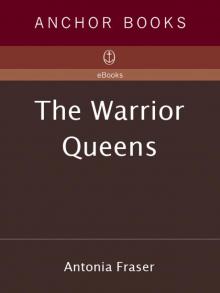 Warrior Queens
Warrior Queens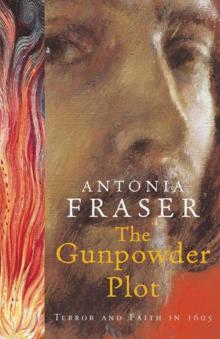 The Gunpowder Plot
The Gunpowder Plot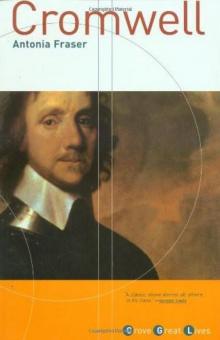 Cromwell
Cromwell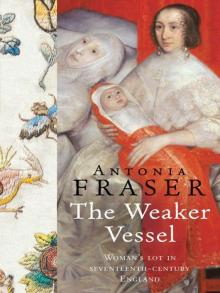 The Weaker Vessel: Women's Lot in Seventeenth-Century England
The Weaker Vessel: Women's Lot in Seventeenth-Century England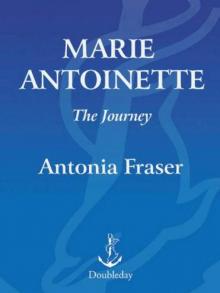 Marie Antoinette: The Journey
Marie Antoinette: The Journey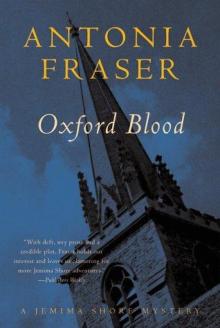 Oxford Blood
Oxford Blood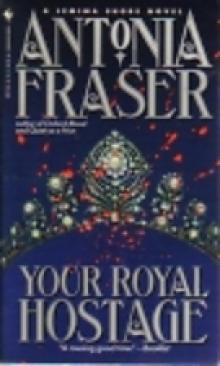 Your Royal Hostage
Your Royal Hostage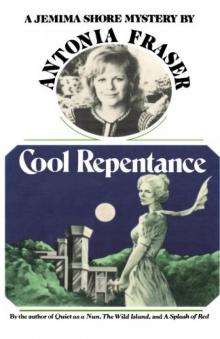 Cool Repentance
Cool Repentance Mary Queen of Scots
Mary Queen of Scots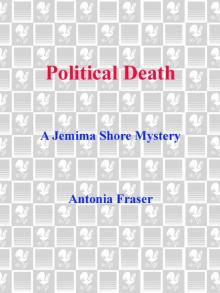 Political Death
Political Death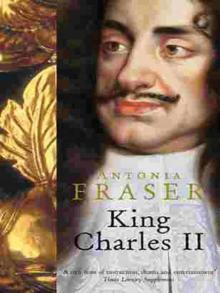 Royal Charles: Charles II and the Restoration
Royal Charles: Charles II and the Restoration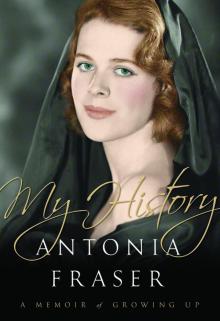 My History: A Memoir of Growing Up
My History: A Memoir of Growing Up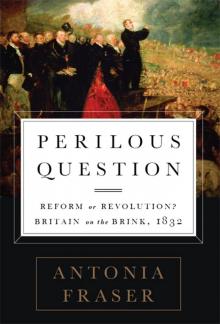 Perilous Question: Reform or Revolution? Britain on the Brink, 1832
Perilous Question: Reform or Revolution? Britain on the Brink, 1832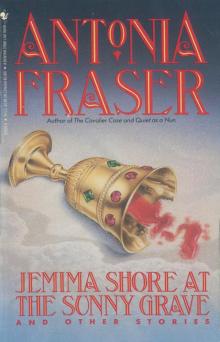 Jemima Shore at the Sunny Grave
Jemima Shore at the Sunny Grave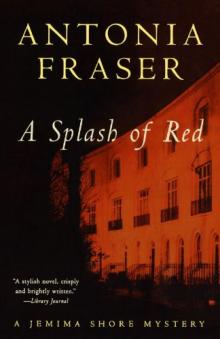 A Splash of Red
A Splash of Red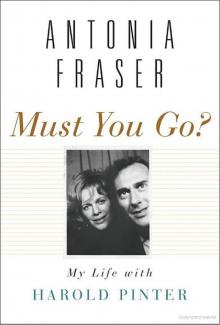 Must You Go?: My Life With Harold Pinter
Must You Go?: My Life With Harold Pinter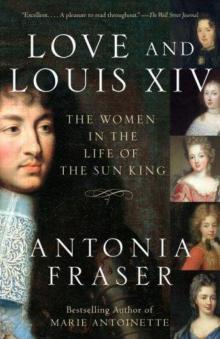 Love and Louis XIV: The Women in the Life of the Sun King
Love and Louis XIV: The Women in the Life of the Sun King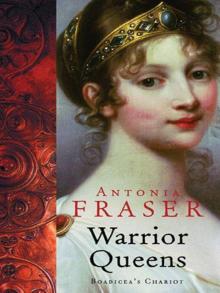 The Warrior Queens
The Warrior Queens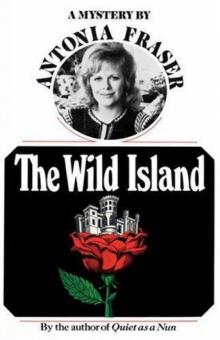 The Wild Island
The Wild Island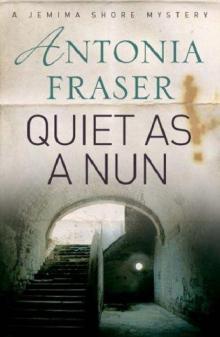 Quiet as a Nun
Quiet as a Nun Perilous Question
Perilous Question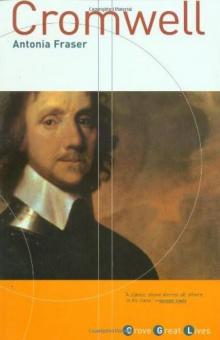 Cromwell, the Lord Protector
Cromwell, the Lord Protector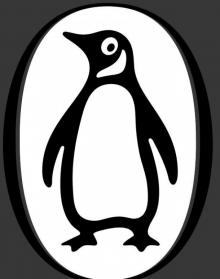 Gunpowder Plots
Gunpowder Plots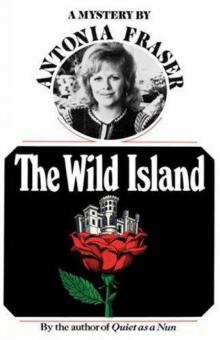 The Wild Island - Jemima Shore 02
The Wild Island - Jemima Shore 02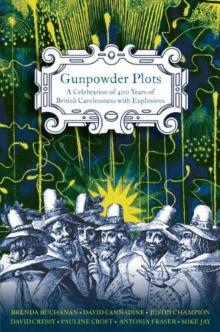 Gunpowder Plots: A Celebration of 400 Years of Bonfire Night
Gunpowder Plots: A Celebration of 400 Years of Bonfire Night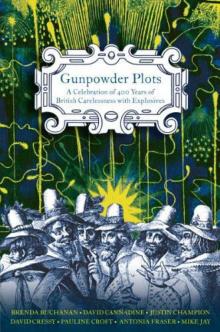 Gunpowder Plots_A Celebration of 400 Years of Bonfire Night
Gunpowder Plots_A Celebration of 400 Years of Bonfire Night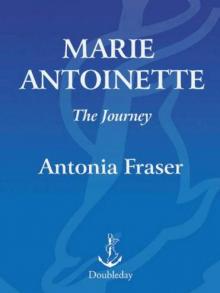 Marie Antoinette
Marie Antoinette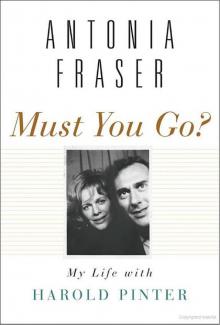 Must You Go?
Must You Go?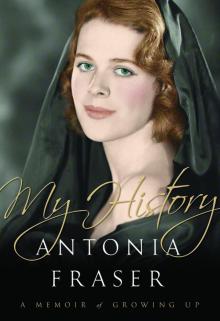 My History
My History